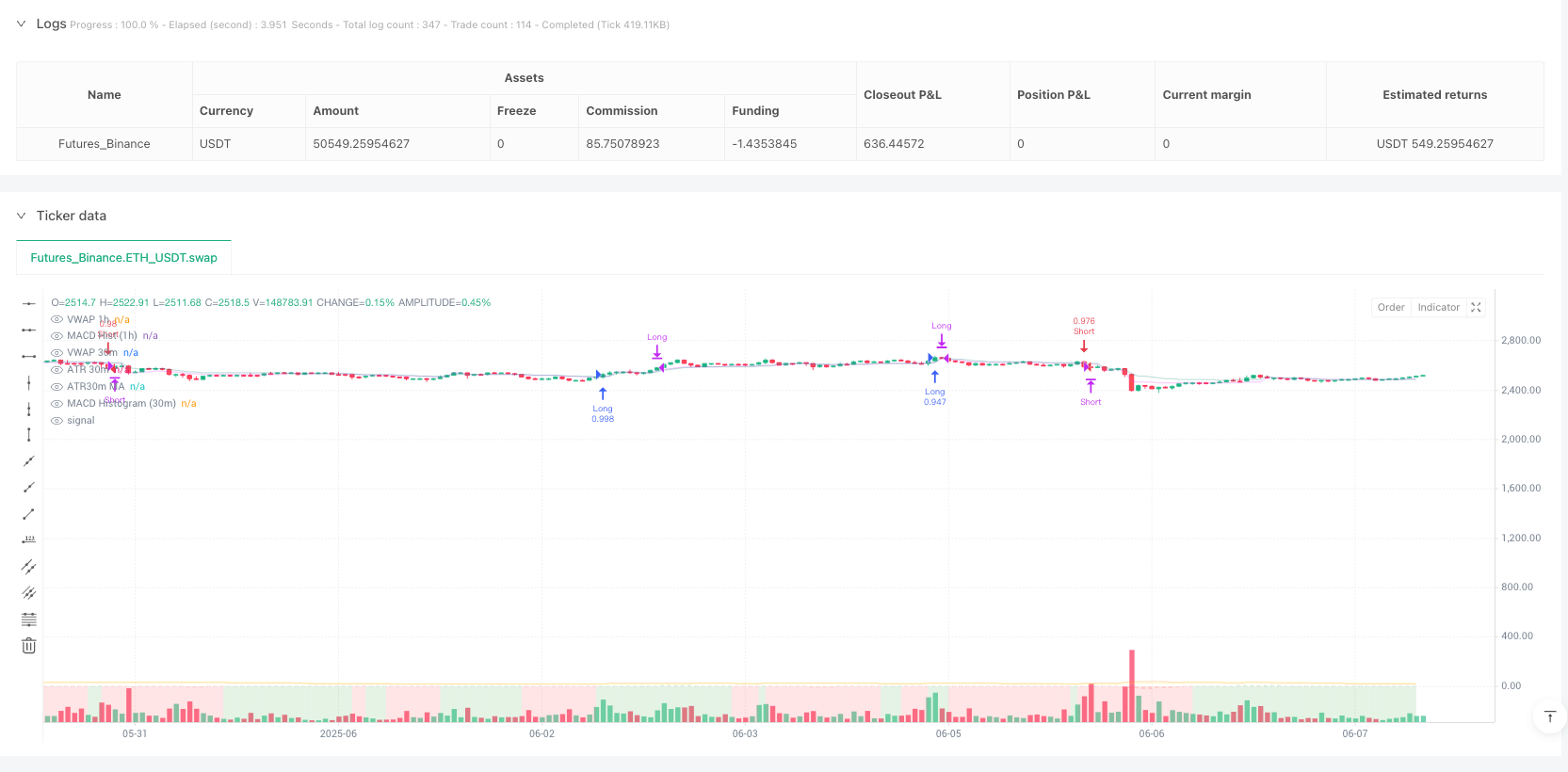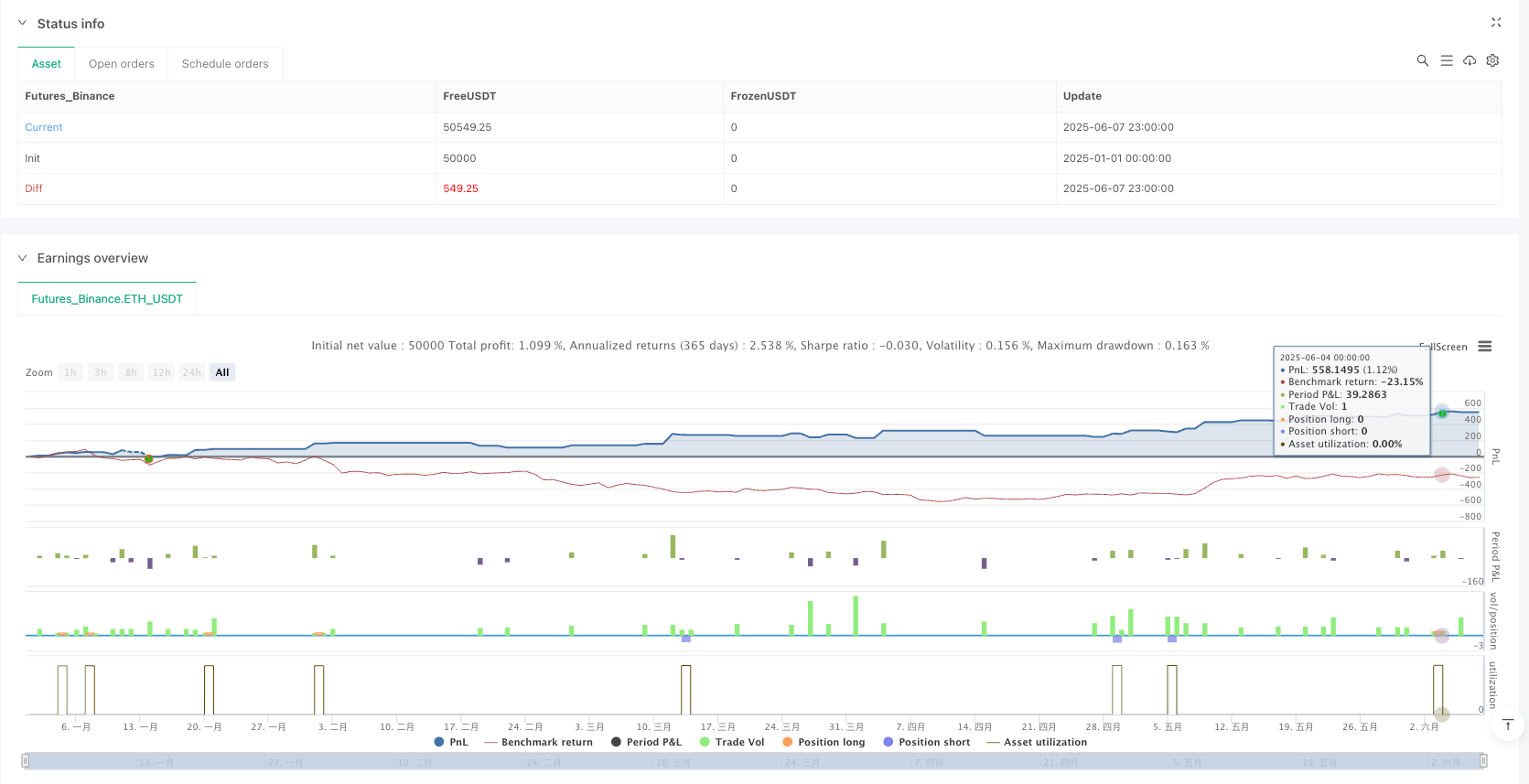

概述
该策略是一种基于多时间框架分析的量化交易系统,主要利用MACD指标、RSI指标、VWAP均线以及ATR波动率过滤器在30分钟和1小时时间框架上的综合信号来执行交易。该策略同时支持做多和做空,通过对不同时间框架的技术指标交叉信号进行确认,并结合波动率条件过滤,以提高交易质量。策略内置固定百分比的止盈止损机制,同时也会在技术指标反转时退出交易,旨在捕捉中短期价格波动。
策略原理
该策略的核心原理是通过多重条件确认来过滤低质量信号,主要包含以下几个关键组件:
多时间框架MACD交叉信号:
- 在30分钟图表上使用MACD(12,26,9)识别主要入场信号
- 可选择性地使用1小时MACD趋势作为确认条件
RSI超买超卖过滤:
- 做多要求30分钟RSI > 55
- 做空要求30分钟RSI < 45
- 1小时RSI作为额外的趋势确认
双重VWAP价格位置确认:
- 做多要求价格同时位于30分钟和1小时VWAP之上
- 做空要求价格同时位于30分钟和1小时VWAP之下
波动率过滤器:
- 使用30分钟图表上的ATR(14)与其20周期均线比较
- 只在当前波动率大于或等于其均值时入场,避免低波动环境下的虚假信号
多层次退出机制:
- 固定百分比止盈(1.5%)和止损(0.5%)
- 30分钟MACD反向交叉退出
- 1小时MACD趋势反转退出
通过这种多层次条件过滤和确认,策略旨在捕捉有明确方向性的中短期波动,同时过滤掉低质量信号,提高胜率和盈亏比。
优势分析
多时间框架确认:通过结合30分钟和1小时时间框架的信号,策略能够更好地识别真实趋势,减少虚假信号的影响。尤其是1小时MACD趋势确认功能,有助于避免逆大趋势交易。
波动率适应性:ATR波动率过滤器确保策略只在市场有足够动能的情况下入场,避免在低波动区间内交易,这有效降低了死区震荡的风险。
灵活的退出机制:策略不仅包含固定止盈止损,还有基于指标反转的动态退出机制,这使得在价格未达到止盈但市场已开始反转时能够及时出场,保护利润。
双重价格位置确认:要求价格同时位于两个时间框架VWAP之上(做多)或之下(做空),这进一步确认了价格动量和方向,减少假突破。
风险管理内置:策略内置了止损机制和仓位管理(默认每次交易使用5%的账户权益),这有助于控制每笔交易的风险敞口,保护资本。
风险分析
低胜率挑战:如代码注释所述,策略可能面临胜率偏低的问题。这是因为多重条件筛选虽然提高了信号质量,但也显著减少了交易频率,导致样本量较小,统计意义受限。
参数敏感性:策略使用了多个可调参数,包括MACD长度、RSI阈值、ATR过滤器参数等。这些参数的微小变化可能对策略表现产生显著影响,存在过度优化的风险。
固定百分比止盈止损的局限性:对所有市场环境使用相同的止盈(1.5%)和止损(0.5%)比例,可能无法适应不同波动率环境。在高波动市场中,止损可能过紧;在低波动市场中,止盈可能过远。
多时间框架滞后性:使用较长时间框架(如1小时)的信号作为确认可能引入滞后,导致错过入场机会或延迟退出。
缺乏市场环境自适应能力:策略未包含区分不同市场环境(趋势/震荡)的机制,可能在某些市场条件下表现不佳。
解决方法: - 考虑引入自适应止盈止损机制,基于ATR或其他波动率指标动态调整 - 增加市场环境识别模块,在不同条件下调整策略参数或交易逻辑 - 实施更严格的回测和前向测试验证,避免过度优化 - 考虑增加交易过滤条件,如时间过滤或趋势强度过滤,进一步提高信号质量
优化方向
动态止盈止损优化:将固定百分比的止盈止损改为基于ATR的动态值,例如使用1.5×ATR作为止损,3×ATR作为止盈。这样可以使策略更好地适应不同的市场波动环境,在高波动时期提供更宽松的止损,在低波动时期收紧止盈目标。
市场环境分类:引入市场环境识别机制,区分趋势市和震荡市。可以使用ADX、布林带宽度或价格与长期移动平均线的关系来识别市场状态,并据此调整策略参数或甚至完全切换交易逻辑。
入场时机优化:当前策略在MACD交叉发生的当前K线入场,可能面临滑点或执行延迟。考虑在交叉确认后的下一个K线开盘时入场,或设置限价单在特定价格区域入场,以获得更好的执行价格。
时间过滤器:增加交易时间过滤器,避开特定的低效率交易时段。例如,可以避免在亚洲时段尾声或欧美交接时段等流动性可能较低或波动不规则的时段交易。
指标参数自适应:将MACD、RSI和ATR的参数设计为自适应值,基于最近的市场波动性或周期性自动调整。例如,在高波动市场可使用较短的MACD参数,在低波动市场使用较长参数。
信号强度分级:为入场信号建立强度评分系统,基于多个因素(如MACD柱状体大小、RSI偏离度、VWAP距离等)对信号进行打分,只执行强度超过特定阈值的交易,或根据信号强度动态调整仓位大小。
机器学习增强:引入机器学习模型来预测哪些信号更可能产生盈利交易,基于历史数据训练模型识别最有价值的模式组合。这可以提高策略的适应性和胜率。
这些优化方向旨在提高策略的稳健性、适应性和长期表现,同时保持其核心逻辑不变。通过这些改进,可以使策略更好地应对不同市场环境和条件的变化。
总结
多时间框架MACD-RSI交叉波动率过滤量化交易策略是一个设计全面的交易系统,通过结合多个技术指标和多个时间框架的信号来识别高质量交易机会。该策略的核心优势在于其多层次的信号确认机制和内置的风险管理功能,使其能够在捕捉价格波动的同时控制风险。
尽管存在胜率偏低的挑战,但策略通过提高平均盈利交易的收益来维持正期望值。通过实施建议的优化措施,特别是动态止盈止损、市场环境分类和信号强度分级等,策略性能有望进一步提升。
该策略适合中短期交易者,特别是那些寻求基于技术分析的系统化交易方法,并且重视风险管理的交易者。策略的多条件确认机制虽然减少了交易频率,但提高了每次交易的质量,这与”少即是多”的交易哲学相符,强调质量而非数量。
在实际应用中,建议交易者先在模拟环境中测试该策略,特别是测试各项优化措施的效果,然后再谨慎地将其应用于实盘交易。同时,持续监控市场条件变化,适时调整策略参数,将有助于维持长期稳定的表现。
/*backtest
start: 2025-01-01 00:00:00
end: 2025-06-08 00:00:00
period: 1h
basePeriod: 1h
exchanges: [{"eid":"Futures_Binance","currency":"ETH_USDT"}]
*/
// This Pine Script® code is subject to the terms of the Mozilla Public License 2.0 at https://mozilla.org/MPL/2.0/
// © GentlemanOfTrading
//@version=6
strategy(title = "ETH Day Trader", overlay = true, margin_long = 100, margin_short = 100, default_qty_type = strategy.percent_of_equity, default_qty_value = 5)
// ==== 1) USER INPUTS ====
// MACD/RSI lengths
fastLen = input.int(12, title="MACD Fast EMA Length", minval=1)
slowLen = input.int(26, title="MACD Slow EMA Length", minval=1)
signalLen = input.int(9, title="MACD Signal EMA Length", minval=1)
rsiLen = input.int(14, title="RSI Length", minval=1)
// RSI thresholds
rsiThreshLong30 = input.int(55, title="RSI30m > (Long)", minval=1, maxval=100)
rsiThreshShort30= input.int(45, title="RSI30m < (Short)", minval=1, maxval=100)
rsiThresh1h = input.int(50, title="RSI1h Threshold", minval=1, maxval=100)
// ATR filter (30m)
atrLen = input.int(14, title="ATR Length (30m)", minval=1)
atrMaLen = input.int(20, title="ATR MA Length (30m)", minval=1)
// Take Profit / Stop Loss (percent)
tpPerc = input.float(1.5, title="Take Profit (%)", minval=0.1) / 100
slPerc = input.float(0.5, title="Stop Loss (%)", minval=0.1) / 100
// Toggle whether to use 1h trend confirmation
use1hTrend = input.bool(true, title="Use 1h MACD Trend Confirmation?")
// ==== 2) FETCH INDICATORS ON 30m ====
// We assume this script is applied on a chart ≤ 30m (e.g. 15m or 5m),
// but if you apply it on a 30m chart it still works: security() with "30" just returns the same bar.
[macd30m, macdSig30m, _] = ta.macd(close, fastLen, slowLen, signalLen)
rsi30m = ta.rsi(close, rsiLen)
atr30m = ta.atr(atrLen)
// ==== 3) FETCH INDICATORS ON 1h & VWAPs via request.security() ====
// --- 1h MACD & RSI ---
[macd1h, macdSig1h, _] = request.security(syminfo.tickerid, "60", ta.macd(close, fastLen, slowLen, signalLen), lookahead=barmerge.lookahead_off)
rsi1h = request.security(syminfo.tickerid, "60", ta.rsi(close, rsiLen), lookahead=barmerge.lookahead_off)
// --- 30m VWAP & 1h VWAP (session VWAP) ---
vwap30m = request.security(syminfo.tickerid, "30", ta.vwap(close), lookahead=barmerge.lookahead_off)
vwap1h = request.security(syminfo.tickerid, "60", ta.vwap(close), lookahead=barmerge.lookahead_off)
// ==== 4) BUILD VOLATILITY FILTER (30m ATR vs ATR MA) ====
atr30m_ma = ta.sma(atr30m, atrMaLen)
volatilityOK = atr30m >= atr30m_ma
// ==== 5) MULTI-TIMEFRAME CROSS CONDITIONS ====
// 30m MACD cross signals
longCross30m = ta.crossover(macd30m, macdSig30m)
shortCross30m = ta.crossunder(macd30m, macdSig30m)
// 1h MACD trend confirmation
macdTrendUp1h = macd1h > macdSig1h
macdTrendDown1h = macd1h < macdSig1h
// ==== 6) ENTRY & EXIT CONDITIONS ====
// LONG ENTRY:
// • 30m MACD crossover
// • 30m RSI > rsiThreshLong30
// • (optionally) 1h MACD line > 1h MACD signal
// • Price > 30m VWAP AND Price > 1h VWAP
// • 30m ATR ≥ 30m ATR MA (volatility filter)
longEntryCond =
longCross30m
and (rsi30m > rsiThreshLong30)
and (close > vwap30m)
and (close > vwap1h)
and volatilityOK
and (use1hTrend ? macdTrendUp1h : true)
// LONG EXIT:
// • fixed TP/SL
// OR • 30m MACD crossunder
// OR • 1h MACD falls below signal (trend flipped)
var float entryPriceLong = na
longExitCond = false
if (strategy.position_size > 0)
// Price-based TP / SL checks
entryPriceLong := nz(entryPriceLong[1], strategy.position_avg_price)
longTPprice = entryPriceLong * (1 + tpPerc)
longSLprice = entryPriceLong * (1 - slPerc)
// check TP/SL first
longExitTP = high >= longTPprice
longExitSL = low <= longSLprice
// fallback: MACD crossunder on 30m OR 1h trend flips
macdTrendFlip1h = macdTrendUp1h and (macd1h < macdSig1h)
macdCross30m = shortCross30m
longExitCond := longExitTP or longExitSL or macdCross30m or macdTrendFlip1h
else
entryPriceLong := na // reset when no position
// SHORT ENTRY:
// • 30m MACD crossunder
// • 30m RSI < rsiThreshShort30
// • (optionally) 1h MACD line < 1h MACD signal
// • Price < 30m VWAP AND Price < 1h VWAP
// • 30m ATR ≥ 30m ATR MA (volatility filter)
shortEntryCond =
shortCross30m
and (rsi30m < rsiThreshShort30)
and (close < vwap30m)
and (close < vwap1h)
and volatilityOK
and (use1hTrend ? macdTrendDown1h : true)
// SHORT EXIT:
// • fixed TP/SL
// OR • 30m MACD crossover
// OR • 1h MACD flips up
var float entryPriceShort = na
shortExitCond = false
if (strategy.position_size < 0)
entryPriceShort := nz(entryPriceShort[1], strategy.position_avg_price)
shortTPprice = entryPriceShort * (1 - tpPerc)
shortSLprice = entryPriceShort * (1 + slPerc)
// check TP/SL first
shortExitTP = low <= shortTPprice
shortExitSL = high >= shortSLprice
macdTrendFlipUp1h = macdTrendDown1h and (macd1h > macdSig1h)
macdCrossUp30m = longCross30m
shortExitCond := shortExitTP or shortExitSL or macdCrossUp30m or macdTrendFlipUp1h
else
entryPriceShort := na // reset when no position
// ==== 7) EXECUTE STRATEGY ORDERS WITH LABELS & ALERTS ====
// — Long Entry —
if (longEntryCond and strategy.position_size == 0)
strategy.entry("Long", strategy.long)
label.new(bar_index, low, text="Buy (LT)", style=label.style_label_up, color=color.new(color.green, 0), textcolor=color.white, yloc=yloc.belowbar)
alert("Buy (LT)", alert.freq_once_per_bar_close)
// — Long Exit —
if (strategy.position_size > 0 and longExitCond)
strategy.close("Long")
label.new(bar_index, high, text="Sell (LT)", style=label.style_label_down, color=color.new(color.red, 0), textcolor=color.white, yloc=yloc.abovebar)
alert("Sell (LT)", alert.freq_once_per_bar_close)
// — Short Entry —
if (shortEntryCond and strategy.position_size == 0)
strategy.entry("Short", strategy.short)
label.new(bar_index, high, text="Sell (ST)", style=label.style_label_down, color=color.new(color.red, 0), textcolor=color.white, yloc=yloc.abovebar)
alert("Sell (ST)", alert.freq_once_per_bar_close)
// — Short Exit —
if (strategy.position_size < 0 and shortExitCond)
strategy.close("Short")
label.new(bar_index, low, text="Buy (ST)", style=label.style_label_up, color=color.new(color.green, 0), textcolor=color.white, yloc=yloc.belowbar)
alert("Buy (ST)", alert.freq_once_per_bar_close)
// ==== 8) OPTIONAL PLOTTING (for debugging) ====
// We’ve removed any `transp`/`opacity` arguments. Instead, we use `color.new(baseColor, α)`
// for transparency, where α = 0 is fully opaque and α = 255 is fully transparent.
// 30m VWAP
plot(vwap30m, title = "VWAP 30m", color = color.new(color.teal, 80)) // ~31% transparentlinewidth= 1
// 1h VWAP
plot(vwap1h, title = "VWAP 1h", color = color.new(color.fuchsia, 80), linewidth= 1) // ~31% transparent
// 30m ATR vs ATR_MA
plot(atr30m, title = "ATR 30m", color = color.new(color.orange, 80))
plot(atr30m_ma, title = "ATR30m MA", color = color.new(color.yellow, 80))
// 30m MACD Histogram (bars)
plot(macd30m - macdSig30m, title = "MACD Histogram (30m)", style = plot.style_columns, color = (macd30m - macdSig30m >= 0 ? color.new(color.green, 80) : color.new(color.red, 80)))
// 1h MACD Histogram (area)
h1 = request.security(syminfo.tickerid, "60", macd1h - macdSig1h, lookahead=barmerge.lookahead_off)
plot(1, title = "MACD Hist (1h)", style = plot.style_area, color = (h1 >= 0 ? color.new(color.green, 80) : color.new(color.red, 80)))